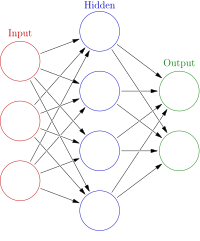
Photo from wikipedia
Vehicular Ad hoc Networks (VANET), as an inseparable part of Intelligent Transportation Systems (ITS), enable data communication between vehicles to promote road safety and traffic efficiency. But adversaries can also… Click to show full abstract
Vehicular Ad hoc Networks (VANET), as an inseparable part of Intelligent Transportation Systems (ITS), enable data communication between vehicles to promote road safety and traffic efficiency. But adversaries can also spread false information across these networks. Therefore, vehicles’ cognitive capabilities with respect to received data must be improved. This requires spatial intelligence and a mechanism to evaluate the trustworthiness of received data. But the dynamic nature of VANETs with intermittent connections, lack of infrastructure and real-time constraints make fulfilling this task very challenging. In this paper, we propose a trust-aware cognitive framework that exploits the redundancies in the exchanged DENM and CAM packets as well as spatial intelligence to filter malicious messages and prevent attackers from disrupting network operation. A novel supplementary mechanism is also presented that applies subjective logic on the pieces of information collected from all network vehicles to detect and isolate malicious entities. To assess the reliability of the proposed scheme, we made extensive comparisons between our model and two others. In the obtained results, our approach outperformed both of them and yielded an accuracy of over 90%, even when 50% of network participants were attackers. The supplementary malicious node detection mechanism of ours similarly yielded high accuracy and F1 scores in the simulations.
Journal Title: IEEE Transactions on Intelligent Transportation Systems
Year Published: 2023
Link to full text (if available)
Share on Social Media: Sign Up to like & get
recommendations!